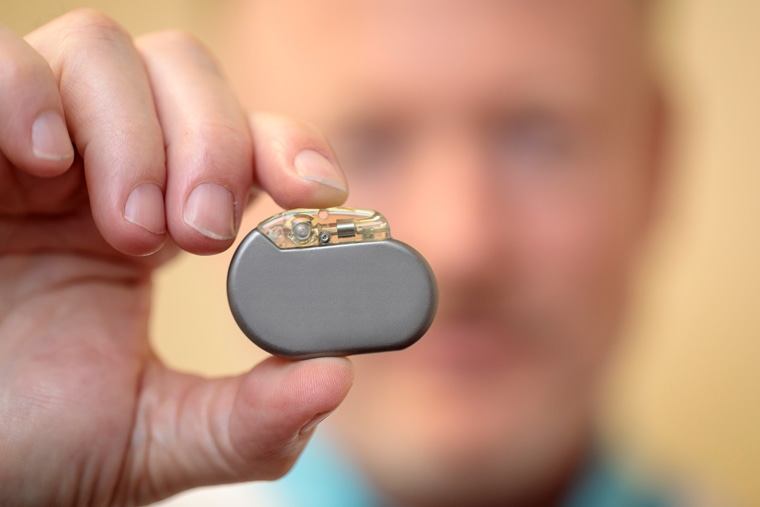An implanted nerve stimulator may help patients with the most severe depression get some of their day-to-day lives back, even if it doesn’t fully relieve their symptoms, doctors reported Tuesday.
Patients who have been using the vagus nerve stimulator say they have regained significant quality of life, and the improvements have lasted for as long as five years, the team reported in the Journal of Clinical Psychiatry.
They hope that their findings will help encourage health insurance companies to pay for the pacemaker-like devices and the surgery needed to implant them. Although the Food and Drug Administration approved the use of the devices for depression in 2005, health insurance companies, including Medicare, rarely pay for them.
The improvements were enough to help people work, socialize and interact with their families better, said Dr. Charles Conway of Washington University School of Medicine in St. Louis, who led the study team.
“It includes overall well-being and sex drive,” Conway said in an interview. “They describe improvements beyond ‘I am not feeling sad or down anymore.' They say things like, ‘I am more enthusiastic about life. I am more involved with my family.' ”
His team studied nearly 600 people; all received typical antidepressant treatment but half of them also had the device implanted. It’s attached to the vagus nerve, a large nerve that travels from the body up into the brain.
"We found that patients who had as little as a 34 percent drop in depression symptoms reported a meaningful improvement in their quality of life," Conway said.
It’s not clear how it might work for depression. The device is also approved to treat epilepsy.
“Brain imaging studies suggest that vagus nerve stimulation may bring about its effects via changes in the prefrontal, cingulate and insular cortex as well as the brain stem,” the team wrote in its report.
“We don’t know for certain but we know that the vagus nerve projects up into the brain and influences a number of regions involved in mood and regulation of mood,” Conway said.
It worked for Charlie Donovan, a St. Louis mortgage contractor.
“At the time, it was life-changing, life-altering,” Donovan told NBC News.
“I was in utter despair and hopelessness. I had probably tried 15 different medications, several hospitalizations, electroconvulsive shock therapy. Nothing was working and I was getting worse.”
Donovan joined an early trial of the device in 2001, which enrolled patients with severe depression who had failed four or more other treatments.
“You had to be the worst of the worst to be in the study,” Donovan said.
It did not do much for him at first, but after six months, Donovan noticed a difference.
“I was not isolating myself,” he said. “I was able to go out and go to the grocery store, do some pretty basic things — go see a movie and have enough concentration to follow the plot, or read a book."
“I started to care about things in my life — how I looked, how I dressed, how I acted in public. These things sound woefully minor to anyone who has not suffered from severe depression.”
Donovan has had a vagus nerve stimulator implanted now for 17 years, although he’s had to have surgery several times to have its battery changed. He also continues on his medications.
“This is the formula that works. I am not changing it. Once you have been in the depths of despair, you don’t want to risk going back to those days,” Donovan said.
Donovan does not pay for the devices or the surgery, but he said he has spoken to other depression patients who cannot persuade their insurance companies to pay for the device or for the procedure to implant it. “It’s probably a $50,000 procedure,” he said.
Donovan said the device maker, a company formerly called Cyberonics and now called LivaNova, provides the device to patients who volunteered for the studies and requires physicians to volunteer their services to implant it.
LivaNova paid for Conway’s study and helped design the trial, but Conway said the company had no control over the findings. “The quality-of-life ratings were done by the patients,” he said. “I oversaw the analysis.”
He said some critics may argue that the placebo effect may account for the findings. "But the placebo effect doesn't usually last for years," Conway said.
The need for better depression treatment is clear.
Major depression is on the rise among Americans from all age groups, but is rising fastest among teens and young adults. A recent Blue Cross and Blue Shield study found a 33 percent increase in major depression diagnoses since 2013.
Persistent and severe depression is strongly linked to suicide, which is also on the increase. Anywhere from 20 percent to 40 percent of depression patients do not respond to current therapies.
Several other teams have also studied vagus nerve stimulation for depression. Only the implanted device is approved in the U.S. for depression, but a hand-held, noninvasive device is approved in Europe. At least one small 2016 study has suggested that it might help treat depression, as well.




